Jun 2020 2nd Edition
Jun 2020 2nd Edition vuyelwan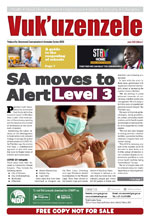
Translations
Youth rewarded for smart COVID-19 behaviour
Youth rewarded for smart COVID-19 behaviour JoySouth African online rewards platform Zlto has been rewarding youth for being positive role models and taking responsible actions during the coronavirus (COVID-19) crisis.
 Zlto (pronounced ‘Zlato’) is a unique platform which was developed in 2016 to help the youth earn an income for volunteering, learning and doing good. Co-founder Allan van der Meulen (24) came up with the idea after attending a workshop at technology non-profit company RLabs.
Zlto (pronounced ‘Zlato’) is a unique platform which was developed in 2016 to help the youth earn an income for volunteering, learning and doing good. Co-founder Allan van der Meulen (24) came up with the idea after attending a workshop at technology non-profit company RLabs.
“Growing up in the Cape Flats, youth unemployment is a huge problem. Many people feel there is no alternative and for a long time, that is what I thought,” says Van der Meulen.
The RLabs workshop changed Van der Meulen’s thinking. He realised that young people are not lazy, they simply lack the opportunities needed to turn their lives around.
This gave rise to Zlto, which promotes community action and helps young people gain the skills they need to secure jobs. The online platform can be easily accessed from any entry-level smartphone. Users who register for free on the platform can perform certain tasks to gain currency, which they can exchange for electricity, airtime, Shoprite goods and transport money.
During the COVID-19 pandemic, Zlto decided to reward young South Africans for practising good hygiene and trying to support themselves through the crisis.
Through the ‘Stay Home, Keep Safe’ initiative, young people are rewarded for tasks such as washing their hands, cleaning their homes and caring for loved ones. They are also rewarded for applying for government’s R350 Social Relief of Distress Grant.
“We realised many of our young people had little to do. We created tasks that would prevent COVID-19 spread such as adding the government’s Covid 19 WhatsApp number and washing or sanitising your hands daily.”
Users can also access free courses on health, hygiene, life-skills and money management.
How to use Zlto
- Go to app.zlto.co
- Sign up with your email address and create a password.
- Check your email inbox for a verification link.
- You can now log in to the site.
- Click on ‘Earn’ to discover the ways you can earn Zlto points.
- You can choose from several microtasks or even create your own initiative to earn rewards.
- You can spend your Zlto in the ‘Spend’ section of the website.
A guide to the reopening of school
A guide to the reopening of school angenithaParents who are not comfortable with their children going back to school can apply to the Department of Basic Education (DBE) to have their children home schooled.
However, according to Basic Education Minister Angie Motshekga, in terms of the relevant section of the South African Schools Act, parents or guardians need to get home schooling approval from the education authorities.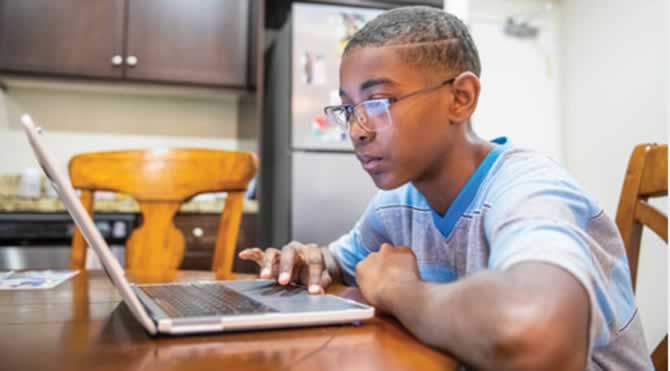
“A parent who chooses not to send a learner to school must apply to the head of the provincial education department who, in the terms of the South African Schools Act, can exempt a learner entirely, partially or conditionally from compulsory school attendance, if such an exemption is in the best interest of the learner,” says Minister Motshekga.
After being closed since the middle of March following the coronavirus disease (COVID-19) outbreak in South Africa, schools have begun to reopen, with the department following a phased-in approach.
Schools were initially set to open on 1 June but that was postponed for a week because some schools were not ready.
The first group to go back were grades 12 and seven pupils, on condition that their school had the necessary personal protective equipment and other safety measures in place to safeguard both staff and learners, says Minister Motshekga.
She says the safety of pupils, teachers and support staff is the department’s number one concern. “Critical to the reopening of schools was and still remains absolute compliance with all health, safety and social distancing protocols pronounced by the Department of Health.
Any school or office that does not comply with these measures will remain closed until compliance is reached, says Minister Motshekga.
She urges parents not to send pupils who exhibit COVD-19 symptoms to school.
The Minister says water tanks have been delivered to schools without running water to enable hygiene protocols to be followed.
Reopening of school measures
The DBE printed directives in the Government Gazette pertaining to the reopening of schools and the measures needed to address, prevent and combat the spread of the virus in the basic education sector.Minister Motshekga says the gazette states that people who need to travel between provinces, metropolitan areas and districts to get to and from work on a daily basis will be issued with special travel permits. These will be issued by a head of department or a delegated official, she says.
“There will also be a certificate issued to learners who have to commute to and from school on a daily basis, which will be issued by a principal of a school or a delegated person. The issuing of the certificates must be done in compliance with the regulations.
A person transporting a learner to school must also be issued with a permit.”
She says the school timetable has been re-engineered to make up for the lost school days. “In order to recoup the teaching and learning time lost, the schooling system had to be re-engineered – resulting in an adjustment of the timetables and a review of the curriculum in terms of the National Education Policy Act.
The Act empowers the Minister to determine a national policy for the curriculum framework, core syllabuses and education programme.
“A curriculum workstream, consisting of curriculum experts from the department and from outside the department, is continuously managing this aspect of the re-engineering of the curriculum,” says Minister Motshekga.
The ban on all extramural events at schools, including sport, choral competitions and choral rehearsals, arts and other cultural festivals, remains in place.
Psychosocial support
Schools will be receiving psychosocial support services from the DBE, the Department of Health and the Department of Social Development to help learners, educators and officials who are experiencing social, mental, psychological and emotional difficulties from COVID-19.
The National School Nutrition Programme has also been adjusted so that it is aligned with the phased-in approach of schooling and the Curriculum Recovery Plan of the basic education sector. The DBE is supplying food handlers in schools with the required personal protective equipment, including gloves, aprons and cloth masks.
Art auction raises relief funds for artists
Art auction raises relief funds for artists JoyPule Ratsoma, a young emerging artist based in Tembisa, is not letting the coronavirus (COVID-19) pandemic take away his passion for art.
 Ratsoma (30) was in his last month of an internship as a gallery assistant at the Artist Proof Studio in Newtown when the virus brought everything to a halt.
Ratsoma (30) was in his last month of an internship as a gallery assistant at the Artist Proof Studio in Newtown when the virus brought everything to a halt.
“The studio had to close down, so obviously I had my internship stopped. It was completely unexpected and none of us were prepared for this financially,” says Ratsoma.
However, Ratsoma has become one of the beneficiaries of an incredible initiative to raise funds for young emerging artists, called the Lockdown Collection.
The Lockdown Collection saw renowned South African artists creating a collection of artworks which were then auctioned online. The 21-day campaign raised R2 million. Of this, R250 000 was donated to South Africa’s Solidarity Fund to support government’s efforts to fight COVID-19, while the rest of the money was put into the newly created Vulnerable Visual Artist Fund. The fund has paid out grants to over 100 vulnerable artists to date.
Ratsoma successfully applied for funds and says the money he received has helped sustain his family through these difficult times.
“My mother has been retrenched, so I am currently the only one who can provide an income through this fund. It has been extremely helpful to provide for our essential needs, including healthcare, food, rent and electricity.”
Lauren Woolf, one of the founders of the Lockdown Collection, says that young artists should not be starved of earning a living during this time.
“We cannot afford to lose our artists or their incredible artworks – especially not now, when we need them to bear witness to this moment in time,” says co-founder Kim Berman.
The success of the first collection saw another 21-day Lockdown Collection being launched on 25 May, contributing further funds to the emerging artists and the Solidarity Fund.
COVID-19 claims beloved community member
COVID-19 claims beloved community member UrsulaThe death of a King William’s Town resident who succumbed to the coronavirus (COVID-19) has impacted the wider community.
Nosango Mfaka (61) died at Grey Hospital a day after testing positive for COVID-19.
Her nephew and family spokesperson, Eugene Mfaka, says that his aunt was a beloved member of her community. She was quick to help those in need and was active in her church. Eugene says that the news of Nosango’s illness shocked the community to the core.
After the news that she was ill broke, there was a stream of community members coming to check on Nosango at her Mamatsha village home.
“In her church, she participated in whatever events were happening. When the church was organising something, you would never see her sitting idle, such was her character and passion for all things that concerned her community,” Eugene says of his late aunt.
Nosango contracted the virus when she visited a local doctor for an unrelated health matter. Although the doctor was showing no signs of being infected, days later he fell ill and tested positive for the virus.
According to Eugene, his aunt started feeling weak several days after the news of her doctor’s infection became known. He says she was extremely tired and complained of body pain. Eventually, Nosango was unable to eat and was taken to Grey Hospital where an urgent test was done and it was confirmed that she had the virus.“My aunt went to the hospital on Monday [20 April] and when they saw her symptoms, a rapid test was conducted. On confirmation that she had COVID-19, they admitted her to the intensive care unit. She passed away the following day.”
Final goodbye
In order to curb the spread of the virus, the Mfakas had to forego the traditions practised when a person dies. Eugene says his aunt’s burial was attended by fewer than 20 people, including staff from the funeral parlour.
The funeral took less than an hour and Nosango’s corpse was not taken to her home, as is the norm. A traditional funeral service – at which friends, community and church members say their goodbyes – did not happen.
“Her body went straight to the graveyard where only immediate family members and funeral parlour staff members were present,” he says..
The virus acted quickly in taking Nosango’s life because she had underlying illnesses that made her more vulnerable to the effects of COVID-19, according to Eugene.
Curbing the spread of COVID-19
He adds that before she passed, Nosango inadvertently infected her husband Mzimkhulu (80) and their two grandchildren, aged 13 and five, who lived in the same house. The grandchildren have been put in isolation at a government facility. In addition to this, Eugene says, there is a real possibility that the community members who had gone to visit her may have also been infected.
He says many of the village’s residents do not follow the regulations that government has put in place to curb the virus, explaining that people need to realise that COVID-19 is real and it kills.
“The sad thing is that some people only exhibit symptoms at a very late stage. So we never know that someone has the virus till they are tested for it. Some of the people who have contracted COVID-19 might not even have symptoms because their immune system is that strong, but that does not mean it’s not there.
“People need to practise things such as social distancing, wearing masks and washing their hands to curb the spread of the virus. Unfortunately, they only begin to take things seriously when they are affected. If people do not start listening, the number of deaths will continue to climb,” says Eugene.
COVID-19 lockdown levels explained
COVID-19 lockdown levels explained UrsulaSouth Africa has officially moved to Level Four lockdown restrictions, put in place to slow the spread of the coronavirus (COVID-19).
COVID-19 infections in South Africa continue to rise and the virus poses a significant threat to our country. Government has thus taken a careful approach, consisting of five lockdown levels, to fully reopen the economy.
Level Four explained
South Africa moved from Level Five to Level Four on 1 May.
Government’s regulations for Level Four include:
- In addition to essential services, some other businesses may open, including those that sell baby clothes, bedding, winter clothing and stationery. Hardware suppliers and vehicle maintenance businesses can open, and factories that support these businesses can start manufacturing.
- Restaurants can sell food, but deliveries only.
- A curfew has been put in place. You may not leave your home between 8pm and 5am, unless you have an essential worker permit or need urgent medical attention.
- You may leave your home to exercise, but only between 6am and 9am. However, you must stay within 5km of your home and cannot exercise in groups.
- Fabric face masks are now mandatory. You have to wear one when leaving your home.
- Tobacco products and alcohol are still not allowed to be sold.
- Domestic workers and childminders who live at private households can return to work.
- Businesses that open must have strict social distancing and hygiene measures in place.
- You may only travel between provinces for funerals or to return to work or home.
- You may still not visit family or friends.
- You can use public transport, such as trains and buses, under strict conditions.
The relaxed lockdown will allow around 1.5 million workers to return to work, as shops and industries such as mining and agriculture start expanding their operations.
Cooperative Governance and Traditional Affairs Minister Nkosazana Dlamini-Zuma reminded South Africans that Level Four does not mean that the lockdown is over. As infections around the country continue to increase, it is important for all citizens to continue to follow regulations so that the healthcare system is not overwhelmed, she says.
“Let me say again, briefly, that Level Four does not mean the lockdown has ended. Stay in your home. Wear a mask. Wash your hands. Keep your distance from other people,” the minister says.
Level Three
Government will base a decision to move down to Level Three on various factors, such as the rate of new COVID-19 infections. When the virus spread is less and the healthcare system can cope with the spread, the lockdown will move to Level Three.
The regulations under Level Three include:
- All workers will be allowed to return to work at factories. All workplaces must have COVID-19 prevention measures in place.
- Alcohol sales will be permitted from Monday to Wednesday, between 8am and 12pm. You will only be allowed to buy alcohol to drink at home. Bars and shebeens will remain closed.
- Restaurants will only be able to deliver orders.
- More businesses will be allowed to open, allowing more workers to get back to work. These include employees in sectors such as vehicle manufacturing, construction, clothing, real estate and gardening.
- Limited travel, including travel between provinces, will be allowed in some circumstances.
- Laundry and dry-cleaning services will be permitted.
Level Two
A move down to Level Two will see more regulations eased, as the virus spreads at a low level and our healthcare system is fully prepared.
Level Two regulations include:
- Manufacturing to be scaled up to 100 percent employment.
- All retail will be permitted.
- Business travel will be allowed.
- Accommodation will be opened for business travellers.
- Restaurants can open for takeaways and delivery.
- Travel between provinces will be allowed.
Level One
Level One is the scenario that government is aiming for. This will only happen when there is minimal spread of the virus and if South Africans adhere to regulations in the higher lockdown levels.
Under Level One, most activities and businesses will be permitted, but COVID-19 prevention guidelines, such as social distancing and proper hygiene, will still have to be followed.
It is important for all South Africans to work together to prevent the spread of COVID-19 so that we can all return to work and see our country returning to normal.
Chepa Streetwear rises above COVID-19
Chepa Streetwear rises above COVID-19 vuyelwanFashion business owner Dumi Mahlangu's hard work and creativity is an inspiration to young entrepreneurs, especially those who may have been affected by the coronavirus disease (COVID-19) pandemic.
Mahlangu (35) is the owner of one of South Africa’s hottest up-and-coming fashion brands – Chepa Streetwear. In 2017, he made the move from an insurance and investment company to follow his passion for fashion.
After starting the business from scratch, the entrepreneur began selling his clothes on WhatsApp and through word of mouth.
“The transition was hard but very exciting, which has made the journey even more rewarding.”
Thinking of ways to expand his business, Mahlangu got in touch with emerging online retailers and taught himself more about selling products online. Today, his stylish clothes are delivered around th e country and also internationally. The business employs 12 permanent staff members.
e country and also internationally. The business employs 12 permanent staff members.
During the national lockdown, Mahlangu had to stop production for a month but used the opportunity to focus more on the potential of online sales.
“The majority of South Africans still don’t trust buying items online. So we developed videos to teach people how to buy online. We had to prove that it is secure. COVID-19 has so many disadvantages, but it also opened up opportunities to really grow online platforms.”
Typical of the entrepreneur, Mahlangu also looked at how he could develop new products during the pandemic and the result is a line of fashionable face masks.
“South Africans like nice clothes and they like to look good. So apart from wanting the masks, the clients will often also take the matching jacket! This really helped us to stay afloat during these tough times. You need to get creative.”
Top tips for young entrepreneurs
For Youth Month, Mahlangu says that young people who want to be entrepreneurs should not wait for opportunities to fall from the sky.
“A lot of people wait for things to happen or wait for an opportunity to come along. The truth is that this doesn’t happen unless you are very lucky. I encourage you to create something and trust in yourself. When you do that, other people will buy into your vision and trust in it too,” he says.
He adds that you don’t need huge amounts of money to start a business.
“Many people don’t understand the power of bartering. For example, if you are selling vegetables, then find someone with a bakkie. Ask them if they can deliver vegetables to clients, in exchange for your products. This helps you build your client base.”
Course set for post-school learning
Course set for post-school learning angenithaGovernment is determined that no post-school student shall be left behind as innovative ways are found to forge ahead despite the coronavirus pandemic.
Educational websites of public institutions of higher education and training have been zero-rated.
This was a result of a collaboration between the Department of Higher Education and Training, the Department of Communications and Digital Technologies and electronic network providers, including mobile network operators.
This means that access to these websites will be free, although some of the embedded content, like YouTube and videos, will be charged for.
The initiative will benefit students who have enrolled in public universities, technical vocational education and training (TVET) colleges, community education and training colleges, agricultural colleges and nursing colleges.
The announcement was made by Higher Education and Training Minister Blade Nzimande when he spoke about the implementation of measures in the post-school education sector in response to the coronavirus (COVID-19) pandemic.
“This is a huge step forward and highlighted the effective collaboration between the department and the telecommunications sector. The next step is to make data bundles available to all National Student Financial Aid Scheme (NSFAS) students in universities and TVET colleges,” the Minister said.
Data rates
The data bundles will be used to access additional content that is not covered under the zero-rating agreement.
Minister Nzimande said the department has successfully negotiated with all mobile network operators for favourable rates for NSFAS students, including Funza Lushaka students who will receive 10GB day-time and 20GB night-time data for three months, until the end of August. This will be subsidised by government.
He said the department has acknowledged that the cost of connectivity remains a huge barrier for students when it comes to digital learning. To further address this challenge, Minister Nzimande aims to supply an appropriate digital device, most likely a tablet, to NSFAS students registered at public institutions.
He said access to technology will better prepare students for the modern economy.
While the department acknowledges that many students not receiving NSFAS funding have also been financially hard hit by the COVID-19 pandemic, government is unfortunately not in a position to subsidise them. However, he appealed to mobile network operators to work with learning institutions in offering students affordable device-data packages. An affordable higher education loan scheme involving the private sector is also being considered.
Registering cellphone numbers
Minister Nzimande reminded NSFAS and Funza Lushaka students to ensure they register their cellphone numbers with their respective institutions to receive their free data.
“We advise that during this period, they must not change their sim-cards so as to enable network operators, through their institutions, to load data to their devices,” he said.
“I just want to emphasise that this data that needy students will receive must be used for dedicated online educational platforms for teaching and learning, as approved by institutions,” he added.
He said the department has also made free digital content available specifically to TVET college students through the department’s website, the National Open Learning System, institutional websites and other sites. Students will be able to access digital materials which will help them prepare for exams.
Minister Nzimande said universities will be delivering paper-based teaching and learning materials to students who do not have the resources to engage electronically or online.
“The physical delivery of learning materials is one aspect of our multimodal approach that many of our universities are implementing,” he said.
However, the Minister said the implementation of this intervention depends on each university’s assessment of the number of students that require this kind of support.
“Some universities have already issued their students with laptops – some as part of their normal policies, others as a response to COVID-19. A lot of work had to be undertaken to quantify the exact number and location of students who still need to be issued with devices,” he said.
He added that work has been completed and procurement will commence as soon as the approval of the Minister of Finance is received.
During the lockdown, NSFAS remains fully operational and continues to disburse allowances to all NSFAS beneficiaries.
Students who have enquiries or complaints, can call the department’s call centre at 0800 872 222 or the NSFAS toll-free line at 0800 067 327 or World Skills South Africa 's contact centre at 086 999 0125.
Fake news puts lives at risk
Fake news puts lives at risk Estelle GreeffThese are historic times, with life as we know it in a state of flux. It is important that people keep abreast of all developments so that they can adhere to lockdown restrictions and keep themselves safe – but to do this, they need to know the difference between real and fake news.
Fake news is based on information that is not correct. It is often created by individuals who want to spread fear and panic, or by people who believe in theories that are not based on any scientific fact.
The Department of Health’s (DoH) SA Coronavirus website describes three types of fake news:
- Disinformation: Information that is false and deliberately created to harm a person, social group, organisation or country.
- Misinformation: Information that is false but not created to cause harm or mislead readers.
- Mal-information: Deliberate publication of private information for personal or private interest, as well as the deliberate manipulation of genuine content.
Fake news can take the form of WhatsApp messages, social media videos or articles on fake news websites. In South Africa, we have seen a rise in the amount of fake news being spread about COVID-19. This has the potential to hamper government’s efforts to slow the spread of infection.
Identify fake news
The DoH advises that when you receive information about COVID-19, you verify the source of the information.
If you are able to access the internet, then you should immediately research the information. You should quickly be able to find out whether it is true.
In general, you should not trust any information that comes from an ‘anonymous source’. Make sure that you find out if something is factual before sharing it or you could cause unnecessary panic and even get into trouble with the police.
You should not rely on social media and WhatsApp messages for reliable news and advice on COVID-19. Limit yourself to getting information from reliable sources, such as the World Health Organisation and the DoH. This information is based on scientific fact and intense research into COVID-19.
Government has set up a coronavirus hotline and a WhatsApp portal where you can ask any questions you may have about COVID-19 information. Call 0800 029 999 or send the word ‘Hi’ to 0600 123 456 on WhatsApp.
Farm evictees receive new homes
Farm evictees receive new homes vuyelwanVictims of farm evictions near Roodepoort in Johannesburg were relieved to be given new electrified homes after living in a tented settlement for over four years.
Living in tents made it difficult for them to adhere to some of government’s coronavirus (COVID-19) regulations, such as social distancing and practising safe hygiene.
Less than two months after Human Settlements Minister Lindiwe Sisulu visited the area, the Ikemeleng community moved into their new homes in May. 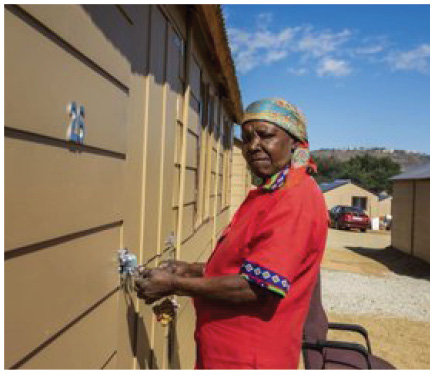
Emotions were high when the over 70 temporary residential units (TRUs) were handed over by Minister Sisulu, who was accompanied by Gauteng MEC for Human Settlements, Urban Planning, Cooperative Governance and Traditional Affairs Lebogang Maile.
According to the department, the COVID-19 pandemic has put pressure on government to find housing solutions for people currently living in overcrowded areas.
Already, 29 densely populated informal settlements have been identified across the country and work is under way to ease congestion in these areas by providing new homes, constructed using alternative building technology (ABT).
Minister Sisulu says the use of ABT is yet to be embraced by everyone in society as the majority still prefer brick and mortar. However, she believes that ABT results in decent homes and saves time. Should the technology become the norm, government will be able to build more houses within a shorter period of time.
TRUs are being erected countrywide, in high density areas. One of the priority projects is the construction of 1 000 units at the Mamelodi hostels, which is home to over 8 000 people.
The Gauteng Provincial Government has started allocating and handing over 1 500 units to qualifying beneficiaries in Merafong Local Municipality. The department says beneficiaries will mainly come from Khutsong and Kokosi informal settlements.
There are a number of housing projects which have been completed across the country and Minister Sisulu and the respective MECs have issued a directive that there should be no delay in handing them over to beneficiaries.
These interventions are aimed at improving the living conditions of informal settlement residents while enabling them to effectively practise social distancing as South Africa continues to try to flatten the curve of COVID-19 infections.
Fathers at the centre of ending GBV
Fathers at the centre of ending GBV JoyIt is every person’s responsibility to fight gender-based violence (GBV) in South Africa. This is according to Israel Lehlokwe Sekgale (27) who is a Social Work Services Manager at the Greater Benoni Child Welfare since 2018.
 In his job and on a personal level, Sekgale does all he can to fight against GBV and is involved with various social media groups that tackle the issue.
In his job and on a personal level, Sekgale does all he can to fight against GBV and is involved with various social media groups that tackle the issue.
“I realised that if I don’t take a stand against GBV, no one will. I believe it’s every person’s responsibility to fight against GBV. If we all put in the effort, we could have a violence-free society,” he says.
Sekgale believes that no one deserves to be treated the way we see in the newspapers every day. “GBV is disturbing and disgusting. I always talk about raising a boy child well because they will have problems in the future if they are not raised properly. This is why we have aggressive men today,” says Sekgale.
“Fatherhood should be taken seriously and fathers should mentor their boy children to learn to talk about their feelings instead of acting them out. Boy children should not be taught to be strong and ‘never cry’, like most African cultures encourage, as they bottle up their anger and only show it later when they feel powerful,” he adds.
According to Sekgale, gender roles in families should be blended and no gender should be superior to the other.
“Families should teach their children to speak up about these issues and not tolerate any level of abuse, even if it seems small. Some people, because of their family backgrounds, don’t see anything wrong with GBV because they are used to living with it and have normalised it. It is very wrong and these people need to be helped.”
Sekgale conducted research into absent fathers during his social work master’s degree in 2018. “It showed the negative effects an absent father has on a child,” he confirmed.
Benoni Child Welfare Greater Benoni Child Welfare, a registered non-profit organisation, renders services to the Daveyton and Benoni communities. “We work specifically with child-related matters, but cannot work with the children in isolation as they come from families,” says Sekgale.
Benoni Child Welfare works with all children, regardless of their gender, to combat abuse and educate its clients about GBV. It also has a place of safety for 20 children and offers various services to its community.
For more information, visit http://benonichildwelfare.org.za.
Global audience for online artists
Global audience for online artists JoyOnline exposure introduces the work of artists to an international audience.
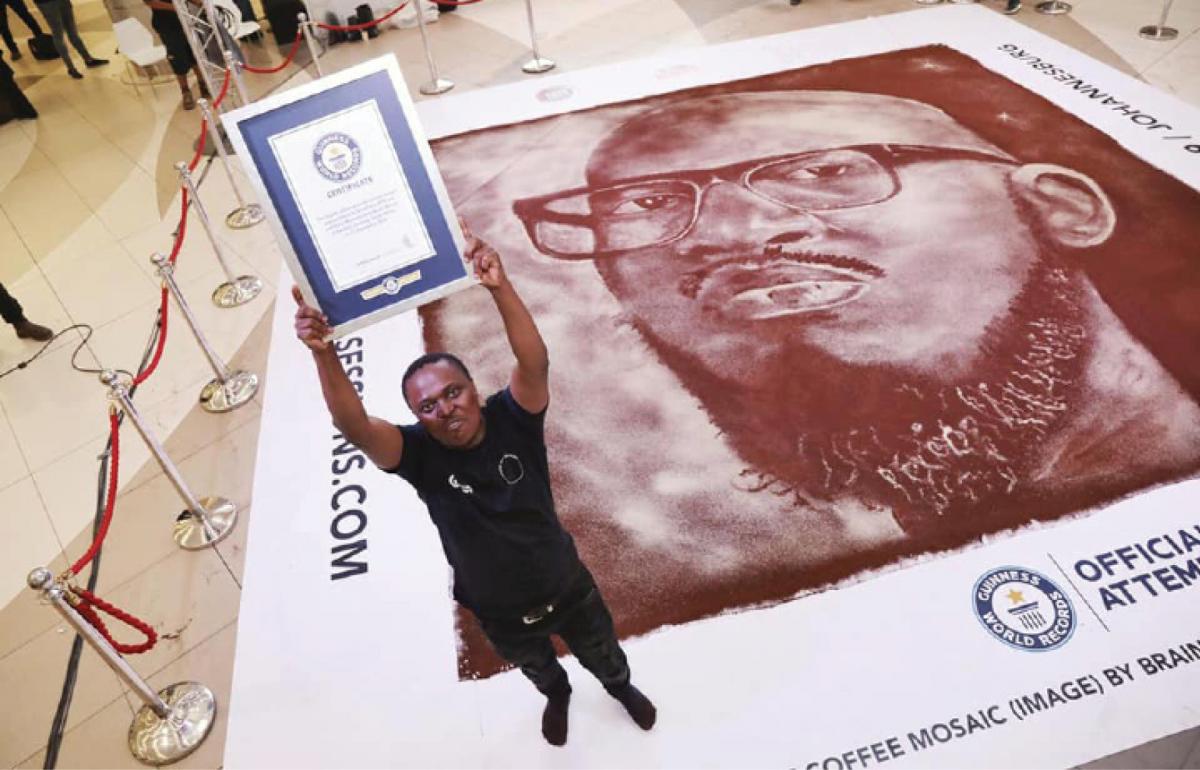 The arts sector is moving online at a more aggressive rate as the impact of the coronavirus (COVID-19) continues to be felt across South Africa.
The arts sector is moving online at a more aggressive rate as the impact of the coronavirus (COVID-19) continues to be felt across South Africa.
Visual artist and Guinness World Record holder Percy Maimela (35), from Winterveldt in Pretoria, was forced to move his annual Salt of the Earth exhibition to the South African State Theatre’s YouTube channel. It premiered on 24 May.
Maimela says artists should familiarise themselves with using digital platforms as the COVID-19 virus will be with us for a long time. “As artists, we need to research platforms that are available which we can use to exhibit our works. We need to use social media and digital galleries to show and sell our artworks,” he says.
Artists can make a lot more money through online platforms, he believes, because they give artists access to a new clientele that would not have been available if their art was only exhibited at traditional galleries.
He says: “When you use digital platforms, you get access to clients that are from far and wide. You can find yourself selling art to people in Russia, China or America because they saw it online.”
Maimela says that during the lockdown, he has learnt how to market and sell his work online.
The world record Maimela holds is for creating the largest ground coffee mosaic in the world. Using ground coffee beans, Maimela created a five-by-five metre portrait of musician Nkosinathi Maphumulo, popularly known as Black Coffee. Maimela created the portrait of the muso in three-and-a-half hours.
“Last year, I was approached to do a portrait of Black Coffee by a company that was hosting an event and Black Coffee was one of their guests. I then pitched the idea of getting Guinness World Records to come and verify my work,” Maimela says.
A former retail store salesman, Maimela started using salt and sand to create art in 2014 and became a full-time artist in 2016.
The Salt of the Earth exhibition is in its third year and started with physical exhibitions during the annual Mzansi Fela festival held between November and December by the State Theatre.
JCPS Cluster outlines Level 3
JCPS Cluster outlines Level 3 vuyelwanThe Justice, Crime Prevention and Security (JCPS) Cluster has announced measures to enforce South Africa’s coronavirus (COVID-19) Level 3 regulations.
Police Minister Bheki Cele said the JCPS Cluster will ensure that the public adheres to the Level 3 regulations that were announced by Cooperative Governance and Traditional Affairs Minister Nkosazana Dlamini-Zuma. 
“Under Level 3, the responsibility of preventing the spread of the disease will be in the hands of every member of society,” Minister Cele said.
Permits for movement
Minister Cele reiterated that the movement of persons between provinces, metropolitan areas, districts and hotspots is prohibited, except for persons doing so to carry out work responsibilities or performing any service permitted under Level 3. “These people need a permit issued by their employer,” he said.
People who need to travel to move to a new place of residence, care for an immediate family member, attend funerals, transport mortal remains, obtain medical treatment or return to their place of residence from a quarantine or isolation facility must have a permit from the authority concerned.
“The South African Police Service and other law enforcement agencies will continue to monitor local and inter-provincial movements, by holding roadblocks on national highways and rotating in suburbs, cities and towns,” Minister Cele confirmed.
In hotspots around the country, where the COVID-19 infection rate is increasing rapidly, the JCPS Cluster will conduct patrols and roadblocks.
Alcohol and tobacco sales
In Level 3, alcohol can only be sold from Monday to Thursday, between 9am and 5pm. Alcohol sales on Fridays, Saturdays, Sundays and public holidays are prohibited. The same rules apply to e-commerce alcohol sales.
“In Level 3, licenced liquor traders can sell liquor for consumption off-site. The consumption of liquor at the place of sale is prohibited,” the Minister said.
The transportation and distribution of liquor to licensed premises was permitted from 29 May.
“No special or events liquor licences may be approved for the duration of the national state of disaster,” said Minister Cele.
The sale of tobacco, tobacco products, e-cigarettes and related products remain prohibited, except when they are destined for the export market.
Borders still closed
South Africa’s borders are still closed for travel, except for the evacuation of stranded and distressed South African citizens, the evacuation of foreign nationals by their respective foreign missions, the movement of medical treatment cases and the transportation of goods to and from neighbouring countries.
“Daily commuters from neighbouring countries who attend school will be allowed to enter our borders with a special permit, subject to all COVID-19 regulations on transport and health,” said Minister Cele.
“The inspectorate, which forms part of coordinated security operations, will ensure that any undocumented or illegal nationals who are detained will be subject to deportation,” he added.
In addition, no visa or permitting functions will be open to the public in South Africa or at missions abroad during Level 3.
“Asylum and refugee services will remain closed. All asylum seeker permits lawfully issued, which have expired or are to expire during the period of the national state of disaster, are deemed to have been extended to 31 July 2020,” the Minister said.
Non-urgent court cases postponed
Minister Cele said that the Department of Justice and Constitutional Development will issue directives for operations of the Courts during Level 3.
“The department will prioritise urgent cases relating to corruption, sexual offences, gender-based violence and femicide, serious violent crimes, robbery, murder, assault and violation of COVID-19 regulations for speedy resolution.
“Where appropriate, the courts will use audio-visual communication, such as teleconferencing and videoconferencing to conclude urgent cases. All cases which are not urgent will be postponed,” the Minister said.
Minister Cele said the JCPS Cluster has received several allegations relating to the corruption of COVID-19 relief efforts earmarked for poor communities.
“In response to these allegations, the cluster has developed a collaboration framework which will ensure prevention, detection, investigation, prosecution and recovery of stolen assets and funds.
“Law enforcement officials have established an interim structure that will address all allegations of corruption and will ensure that those who are charged, face prosecution,” Minister Cele confirmed.
Let us protect and support our children
Let us protect and support our children vuyelwan
The International Day for Protection of Children, which is commemorated globally on 03 June, draws attention to children's rights around the world and welfare. Fittingly, it is also the UN Global Day of Parents on the same day, honouring the commitment of parents and caregivers to the wellbeing of children.
I want to thank the millions of parents, grandparents and caregivers around South Africa who continue to play an important role in the formative years in the lives of our youngest citizens. The encouragement, support and protection children receive from their parents and caregivers is essential for their future happiness and success.
On 01 June the country started a new phase in its fight against the coronavirus. Many economic and social activities restarted, including a phased resumption of schooling. 
We have said that we are taking a gradual approach, guided by the advice of our scientists and led by the realities on the ground and consultations with stakeholders.
In the last few weeks, as we have prepared to return to school, we have had extensive and detailed discussions with all role-players in the education sphere. These have guided our approach to this complex and challenging task.
Several of these stakeholders – including teachers and parents – have expressed concern about the state of readiness in many schools. We have heard them, we welcome their contributions and are taking steps to address their concerns as well as proposals.
It is understandable that many parents and caregivers have mixed emotions at this time about the reopening of schools. There is relief that children will be able to resume their education after a prolonged absence from classrooms and lecture halls. Young people are eager to be in school again and to see friends and teachers.
But there is also apprehension on the part of parents, educators and learners themselves.
Parents want reassurance that the necessary precautions should be in place to adequately protect learners. The safety of our youngest citizens from a health and physical perspective is not negotiable. It is our foremost priority.
As we prepare for the gradual re-opening of our schools and places of higher learning, education authorities have been hard at work putting the necessary health and safety measures in place. That documentation regarding standard operating procedures have been provided to all schools. These standard operating procedures cover issues like training and orientation of screeners, timetable realignment and configuring classrooms to meet social distancing requirements.
We are continuing with the process of delivering personal protective equipment and ensuring the availability of water and sanitation services. Learning, once it commences, will take place under strict conditions with a correctly limited number of learners and students.
As parents, teachers, governing bodies and government, we are in agreement that no school should re-open until all the necessary precautions are in place. There needs to be transparency about the level of preparedness of each of the schools. Everyone who is a key role player, be they a parent, a school governing body member, a teacher or a government official should be able to have the correct information about the state of preparedness of each school. It is our collective responsibility to ensure that the learning environment is safe.
I want to salute parents and caregivers, in particular, for the role they have played over the last two months. With schools closed, they have had to take greater daily responsibility for the education and development of their children. Many parents and caregivers have had to assist learners with their schoolwork at home, no doubt gaining a keen appreciation of the hard work being done by our teachers every day.
Once the lockdown is lifted and more learners return to school, we parents should continue to play a more active role in the education of our children, whether it is through joining school governing bodies, volunteering our services at schools or other forms of assistance. Parents can join in volunteering to clean schools, establishing vegetable gardens or being part of neighbourhood school safety committees. This can turn the schools into real, meaningful “community schools”.
Though we may feel anxious and fearful as our sons and daughters leave our care, we must draw courage from the fact that every effort is being made to protect them.
As parents, you have entrusted us with the welfare and safety of your children. It is a responsibility we do not take lightly. In the days and weeks to come, we will be closely monitoring the return to school.
If we follow the protocols and maintain all precautions – as parents, educators, communities and learners – we will effectively minimise the risk posed by the coronavirus.
Ultimately it is both our personal actions and our collective efforts that will keep our children safe. Whatever we do next, we need to do together.
NYDA serves dollop of hope to coffee shop
NYDA serves dollop of hope to coffee shop angenithaA youth-owned restaurant has been kept afloat through a R10 000 cash injection from the National Youth Development Agency (NYDA).
The Tosh, a coffee shop in the heart of Klerksdorp, was funded under the NYDA’s Youth Micro Enterprise Relief Fund as part of government’s efforts to help capitalise businesses that have been impacted by the coronavirus (COVID-19) pandemic.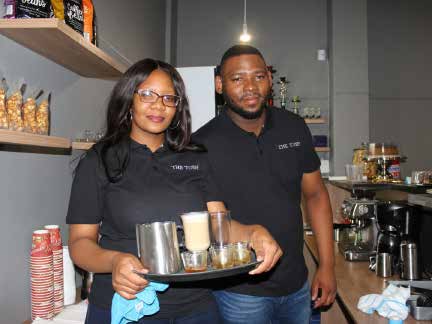
Owners of The Tosh Katlego Matlala (28) and Jason Mfusi (28) received the money three weeks after filing their applications. Matlala says the funding has helped them stay afloat as they wait for restaurants to be given the go-ahead to open.
The R10 000 was used to pay a portion of the salaries of the restaurant’s chef and two waitresses, and was also put towards overheads such as rent and electricity.
When applying for the funding, Matlala says they went onto the NYDA’s website and downloaded the application forms. She says with the help of a consultant from the NYDA, they completed the application form and attached the necessary documents, including financial statements and a business operation certificate from the municipality.
“We were listening to the President’s announcement of stimulus packages for businesses and after that, we scoured the internet for funding opportunities as our business was temporarily shut down,” says Matlala.
The popular coffee shop – which serves pasta, burgers and pizza, among other things – was growing in leaps and bounds when COVID-19 hit.
“I was very excited with the progress we were making but am not sure how things will be when we reopen as our business is a sit-down restaurant,” Matlala says.
One of The Tosh’s successful pre-COVID-19 initiatives was its delivery service to the surrounding offices. “We were still severely impacted by the lockdown in level 4 because our deliveries were mainly to the office parks around our restaurant and when they were shut, we lost a lot of clients,” she says.
The owners of the coffee shop are looking to add traditional dishes to their menu in a bid to attract new clientele after the lockdown.
Fortunately, Matlata says they had managed to negotiate a deal with their landlord to pay only 40 percent of the restaurant’s rent during the lockdown.
New SASSA grant restores young man’s hope
New SASSA grant restores young man’s hope angenithaThabang Ntima (20) of Virginia in the Free State says the COVID-19 Social Relief of Distress Grant has helped reduce some of the stress he has been under as a result of the national lockdown.
He is one of the unemployed South African youth to benefit from the new social grant that is being rolled out by the South African Social Security Agency (SASSA).
He completed matric last year and has been looking for a job without luck for six months.
“My twin brother is studying and is still awaiting feedback from the National Student Financial Aid Scheme on his application. We depend on our single mother to provide for our financial needs. She is not formally employed but transports school children,” he explains. 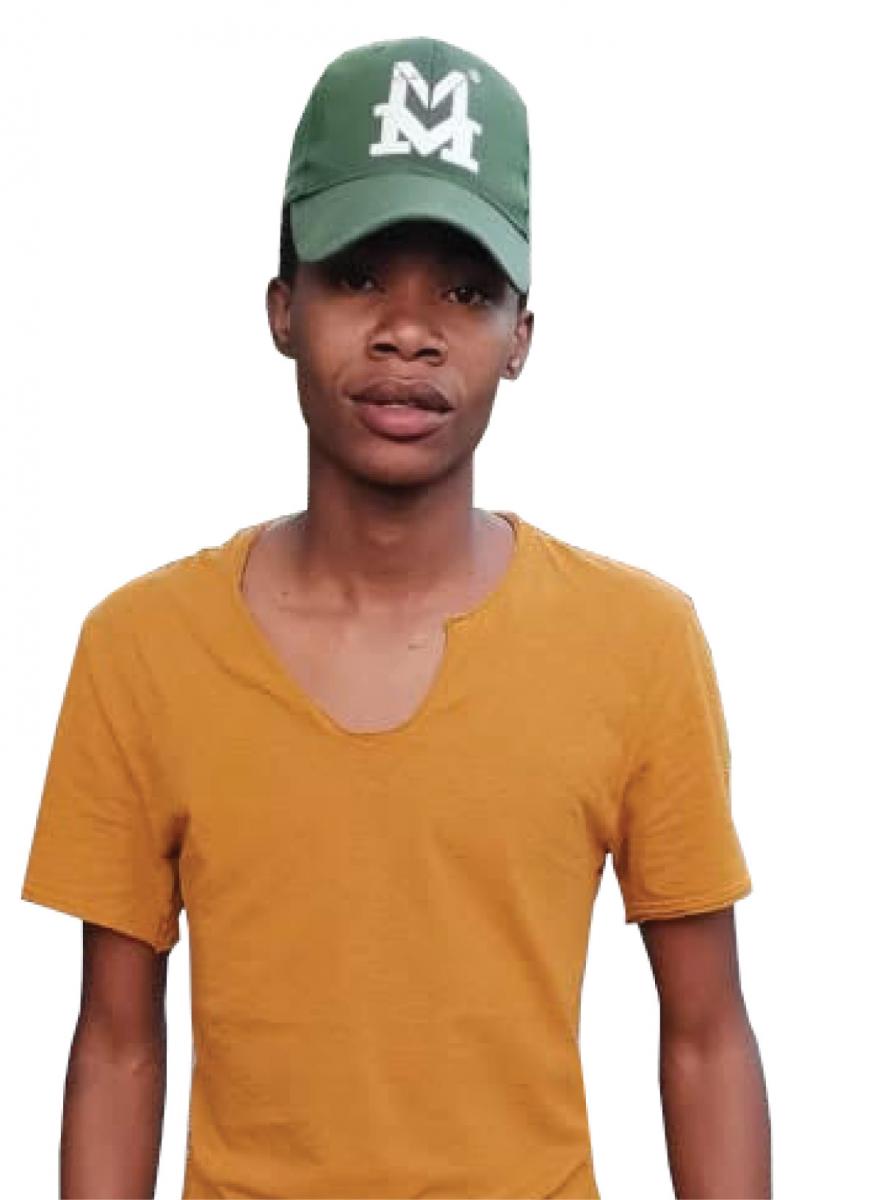
“Our family felt the effects of the lockdown because when the schools closed, my mother’s income dried up. I started stressing a lot because the lockdown also meant that I could not continue physically going out of the house to look for jobs to assist my family.,” he says.
But after getting the new grant, Ntima says he was able to contribute a little to his family income and was able to buy certain things for himself, such as mobile data that he uses to look for jobs online and to stay in touch with relatives and friends while observing the regulations of the lockdown.
“I have also decided that for the six months I will be getting the social grant, I will save some of it so that I can get a learner’s licence when the lockdown is lifted. I hope this will put me in a better position to qualify for job opportunities,” he says.
He was one of the first 10 beneficiaries to apply for the grant during its testing phase and used the WhatsApp option, which he says was a simple process
SASSA says with the country moving to level three and more of its employees back at work, it has accelerated the pace of payments.
By the end of May, just under five million applications had been received, including duplications, incomplete and invalid applications.
Applications can be submitted through one of the following channels:
- WhatsApp line: 082 0468 553
- USSD or SMS Line: *134*7737#
- Email address: srd@sassa.gov.za
- Call centre: 0800 6010 11
- Website: srd.sassa.gov.za.
Policeman puts service above self
Policeman puts service above self angenithaA young police officer is helping feed elderly community members who have been impacted by the coronavirus (COVID-19) in the township of Kraaifontein in Cape Town.
South African Police Service Constable Kwyo Louw (26) has started a food donation drive for the elderly in his community. Louw says many elderly people in his area are dependent on soup kitchens and because of the transport restrictions that were initially enforced during the national lockdown, they battled to get there.
“They would go to bed hungry because they had no one to send to get food for them. I chose to bring the food to the people,” he says.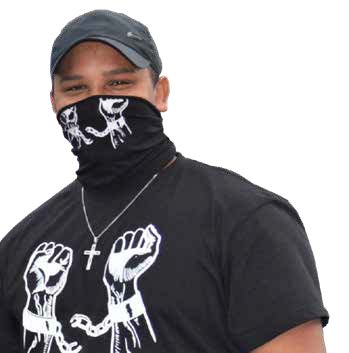
The food donations – made up of vegetables, starches and other basic goods – are coordinated through the KraaiLove WhatsApp group Louw created. The seven-member group finds struggling families and alerts Louw to their plight. Louw then organises food for the group through his contacts. Once that is done, the food is then handed over to the families.
In addition to supplying food parcels, the police officer also runs two soup kitchens which feed over 600 people. The KraaiLove WhatsApp group members also help people with sanitisation to keep themselves safe from the virus.
Louw says the community is riddled with drugs and crime, which is what motivated him to start community development initiatives. “I want to make a difference in my community because when I was growing up here, I would regularly see people selling drugs and witness people being killed in front me. This pushed me to become a community worker,” Louw says.
He hopes to extend his outreach work to people living with addiction and says rather than chasing them away, he would like to assist them with food parcels.
The work done by Louw to develop his community recently earned him a surprise call from the Western Cape MEC of Community Safety, Albert Fritz. Fritz said Louw showcases that the role of a police officer is not simply enforcement but also to look out for those most vulnerable and play a part in addressing socio-economic challenges.
Red Dot taxis assist in the fight against COVID-19
Red Dot taxis assist in the fight against COVID-19 JoyA new taxi service in the Western Cape is providing safe transport to our public healthcare heroes, as well as to patients who have been diagnosed with coronavirus (COVID-19).
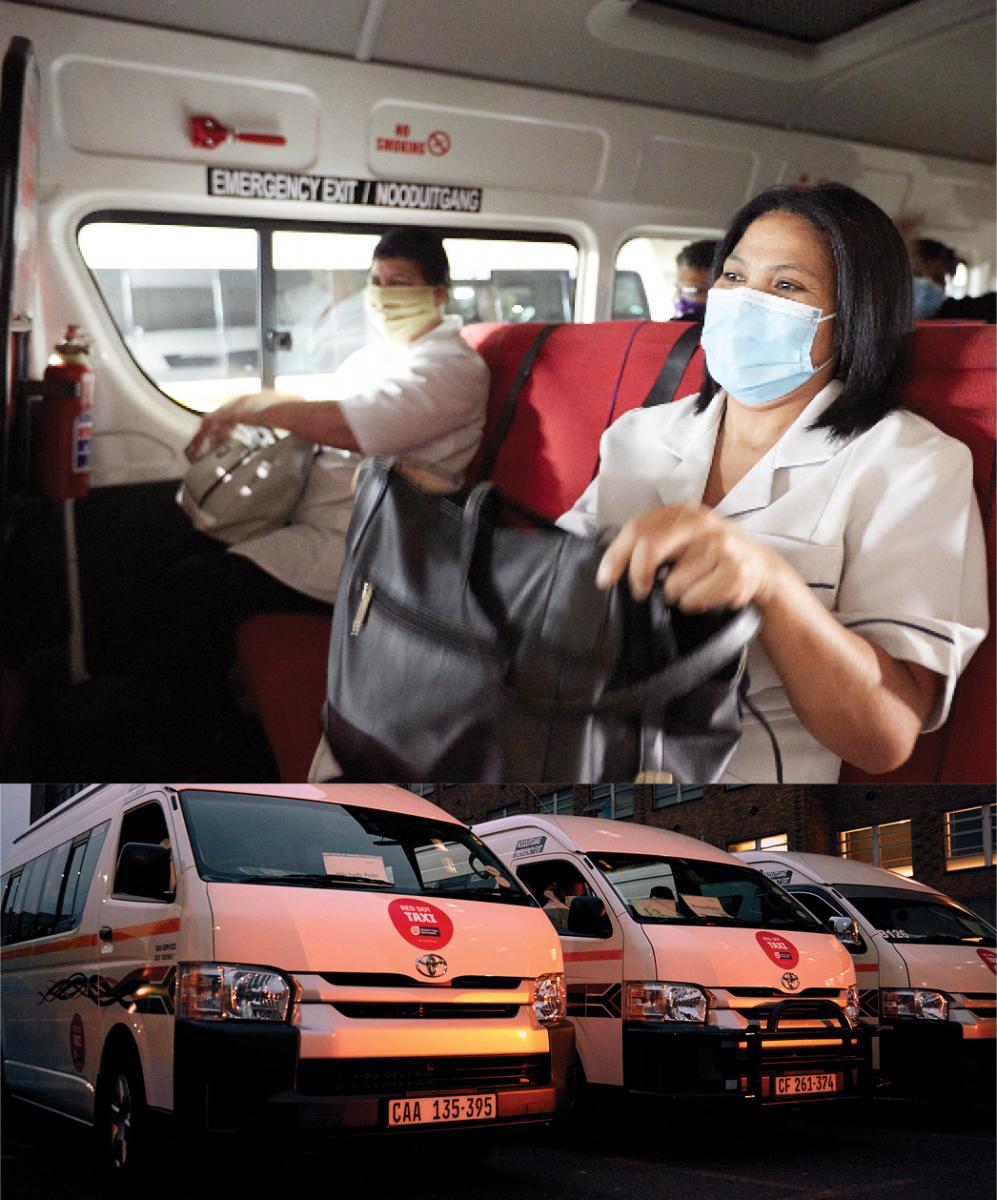 The Red Dot service is a partnership between the minibus taxi industry and the Western Cape Government. It makes use of 100 minibus taxis, marked with red dot stickers, which are delivering critical transport services as part of the fight against COVID-19.
The Red Dot service is a partnership between the minibus taxi industry and the Western Cape Government. It makes use of 100 minibus taxis, marked with red dot stickers, which are delivering critical transport services as part of the fight against COVID-19.
During the lockdown, the service has been transporting healthcare workers in the evenings. The second part of the project involves transporting suspected or confirmed COVID-19 patients to safe quarantine and isolation facilities.
“Because many people are unable to quarantine or isolate themselves, the Department of Health has established public quarantine and isolation facilities across the Western Cape,” says Transport and Public Works MEC Bonginkosi Madikizela. “Red Dot supports the effective functioning of these facilities by providing safe transport for those who need it,” he says.
The minibuses follow extremely strict hygiene standards, including cleaning and sanitisation of vehicles after every trip, the use of masks and appropriate protective gear and a less than 50 percent capacity.
“As government, we will carefully monitor the service with trackers and an intelligent transport system linked to the department’s Transport Hub, as well as on-the-ground monitoring,” says Madikizela.
Meanwhile, the partnership is also strengthening the relationship between government and the minibus taxi industry.
“The minibus taxi industry is critical for the functioning of the economy and, ordinarily, transports millions of people per day, including essential service workers. Like many other businesses, the industry has been hard hit by the lockdown. The Western Cape Government has and will continue to work with the minibus taxi industry to ensure that these essential services continue to operate,” he says.
A new company called Umanyano Travel Services was established to provide the Red Dot service. Director of the company Nazeem Abdurahman says the taxi industry is extremely grateful that government approached them to fulfil this important transport function.
“Instead of the healthcare workers being stranded without transport or having to take four or five taxis to get home, they can now use our service to be transported safely in one trip.”
SA moves to Alert Level 3
SA moves to Alert Level 3 vuyelwanPresident Cyril Ramaphosa has announced that South Africa has moved to Level 3 with effect from 1 June - with more sectors of the economy opening and the removal of a number of restrictions on the movement of people.
Addressing the nation recently on the developments in South Africa’s risk-adjusted strategy to manage the spread of the coronavirus (COVID-19), the President says the country will have a differentiated approach to deal with areas that have far higher levels of infection and transmission.
COVID-19 hotspots
These areas have been declared as Coronavirus disease hotspots. They include the following metros:
- City of Tshwane
- City of Johannesburg
- Ekurhuleni
- eThekwini
- Nelson Mandela Bay
- Buffalo City
- Cape Town.
Other areas that have been identified as hotspots are the West Coast, Overberg and Cape Winelands district municipalities in the Western Cape, Chris Hani district in the Eastern Cape and iLembe district in KwaZulu-Natal.
A hotspot is defined as an area that has more than five infected people per every 100 000 people or where new infections are increasing at a fast pace. 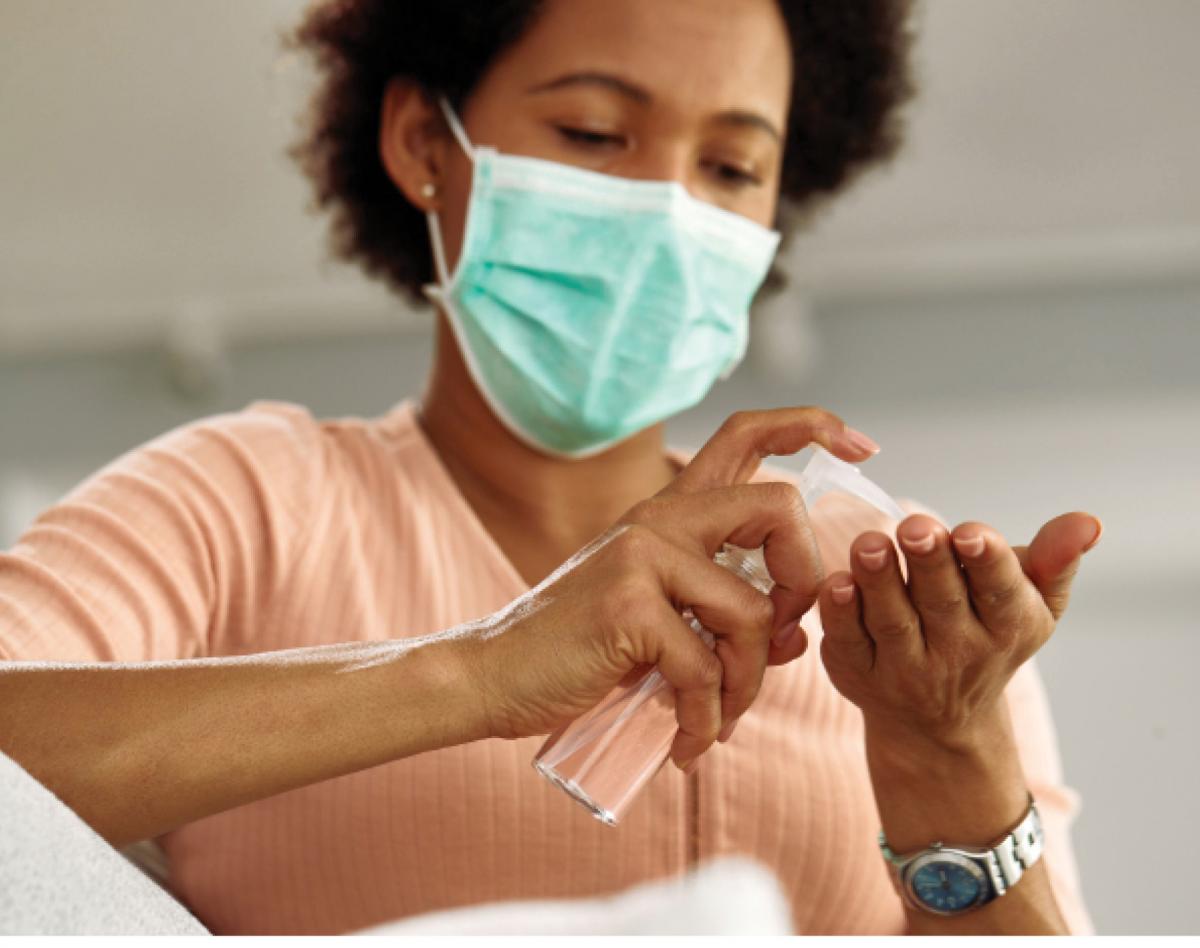
To deal with the virus in these areas, government will implement intensive interventions aimed at decreasing the number of new infections.
“We are putting in place enhanced measures of surveillance, infection control and management. We will assign a full-time team of experienced personnel to each hotspot,” the President says.
This team will include epidemiologists, family practitioners, nurses, community health workers, public health experts and emergency medical services, to be supported by Cuban experts.
“We will link each hotspot to testing services, isolation facilities, quarantine facilities, treatment, hospital beds and contact tracing.
“Should it be necessary, any part of the country could be returned to alert levels 4 or 5 if the spread of infection is not contained despite our interventions and there is a risk of our health facilities being overwhelmed,” he says.
The list of hotspot areas will be reviewed every two weeks depending on the progression of the virus.
Opening the economy
The implementation of alert level 3 which started at the beginning of June, involved the return to operation of most sectors of the economy, subject to observance of strict health protocols and social distancing rules. More public servants have also returned to work in accordance with provisions of the Occupational Health and Safety Act and as guided by the Department of Public Service and Administration, working together with all other departments in government.
Protocols and workplace plans
As more sectors of the economy open, government will rely on social compacts with all key role players to address the key risk factors at the workplace and in the interface between employees and the public.
“We will therefore be finalising a number of sector protocols and will require every company to develop a workplace plan before they re-open,” he says.
According to these plans, companies will need to put in place sanitary and social distancing measures and facilities; they will need to screen workers on arrival each day, quarantine those who may be infected and make arrangements for them to be tested.
“They also need to assist with contact tracing if employees test positive. Because of their vulnerability, all staff who are older than 60 years of age and those who suffer from underlying conditions such as heart disease, diabetes, chronic respiratory disease and cancer should ideally stay at home,” the President says.
Employees who can work from home should be allowed to do so.
Subject to these measures, all manufacturing, mining, construction, financial services, professional and business services, information technology, communications, government services and media services, reopened from 1 June. The appropriate restart and phasing in arrangements will need to be put in place for every workplace.
“Wholesale and retail trade will be fully opened, including stores, spaza shops and informal traders. E-commerce will continue to remain open. Other sectors that opened previously, such as agriculture and forestry, utilities, medical services, food production and manufacture of hygiene products, will remain fully opened,” he says.
High-risk economic activities prohibited
High-risk economic activities will remain prohibited. These include:
- Restaurants, bars and taverns, except for delivery or collection of food.
- Accommodation and domestic air travel, except for business travel, which will be phased in on dates to be announced.
- Conferences, events, entertainment and sporting activities.
- Personal care services, including hairdressing and beauty services.
Movement of people and sale of alcohol
People will be able to exercise at any time during the day, provided this is not done in groups. The curfew on the movement of people will be lifted.
“Alcohol may be sold for home consumption only under strict conditions, on specified days and for limited hours. Announcements in this regard will be made once we have concluded discussions with the sector on the various conditions,” the President says.
The sale of tobacco products will remain prohibited in alert level 3, due to the health risks associated with smoking.
“All gatherings will remain prohibited, except for funerals with no more than 50 people or meetings in the workplace for work purposes,” he says.
Expect rise in infections
President Ramaphosa says, in preparation for the expected increase in COVID-19 infections in the country, around 20 000 hospital beds have been, and are being, repurposed for COVID-19 cases, and 27 field hospitals are being built around the country.
“A number of these hospitals are ready to receive coronavirus patients.”
The President says government appreciates the work that continues to be done by public servants, especially those in the front line in the fight against COVID-19.
“The safety of all workers, including public servants, is a matter of concern to us. We will continue to make all efforts for the adequate provision of personal protection equipment to ensure safety for everyone while at work.
“Our priority is to reduce the opportunities for the transmission of the virus and create a safe environment for everyone,” he says. – SAnews.gov.za
Tips to follow to avoid being infected by the coronavirus disease.
- Stay at home as much as you can.
- Remember to social distance.
- Wear your face mask.
- Wash your hands with soap thoroughly. Wash the back of your hands, between the fingers and under the nails. Always wash your hands with soap before you eat and after being out in public.
- Cover your mouth with a tissue paper when you cough and sneeze. Avoid touching your face with dirty hands at all times.
- Seek medical help if you feel unwell. Typical symptoms of COVID-19 include coughing, runny nose, fever and shortness of breath. If you are experiencing any of these symptoms, seek medical attention promptly.
For more information, call the National Institute of Communicable Diseases’ 24-hour hotline at 0800 029 999 or visit www.health.gov.za and www.nicd.ac.za
Student shares views on virtual learning
Student shares views on virtual learning angenithaKeaoleboga Motlhankane (19) of Rustenburg in the North West believes that it is important to save the academic year in order to avoid future economic challenges.
She is a second-year social work student at North-West University’s Potchefstroom campus.
Given the challenges brought about by the coronavirus disease (COVID-19) pandemic, such as the closing of learning institutions, Motlhankane says virtual learning provides a great opportunity for students to continue learning while adhering to the regulations of the lockdown, which are intended to combat the spread of the virus.
“If we do not save the academic year and instead only focus on fighting the virus, the youth – who are also the future of the country – will be more affected in the long run. We might end up with high numbers of school or university drop-outs in the coming years. The number of unwanted pregnancies and unemployment might also increase, continuing the poverty cycle for many South African families,” says Motlhankane. 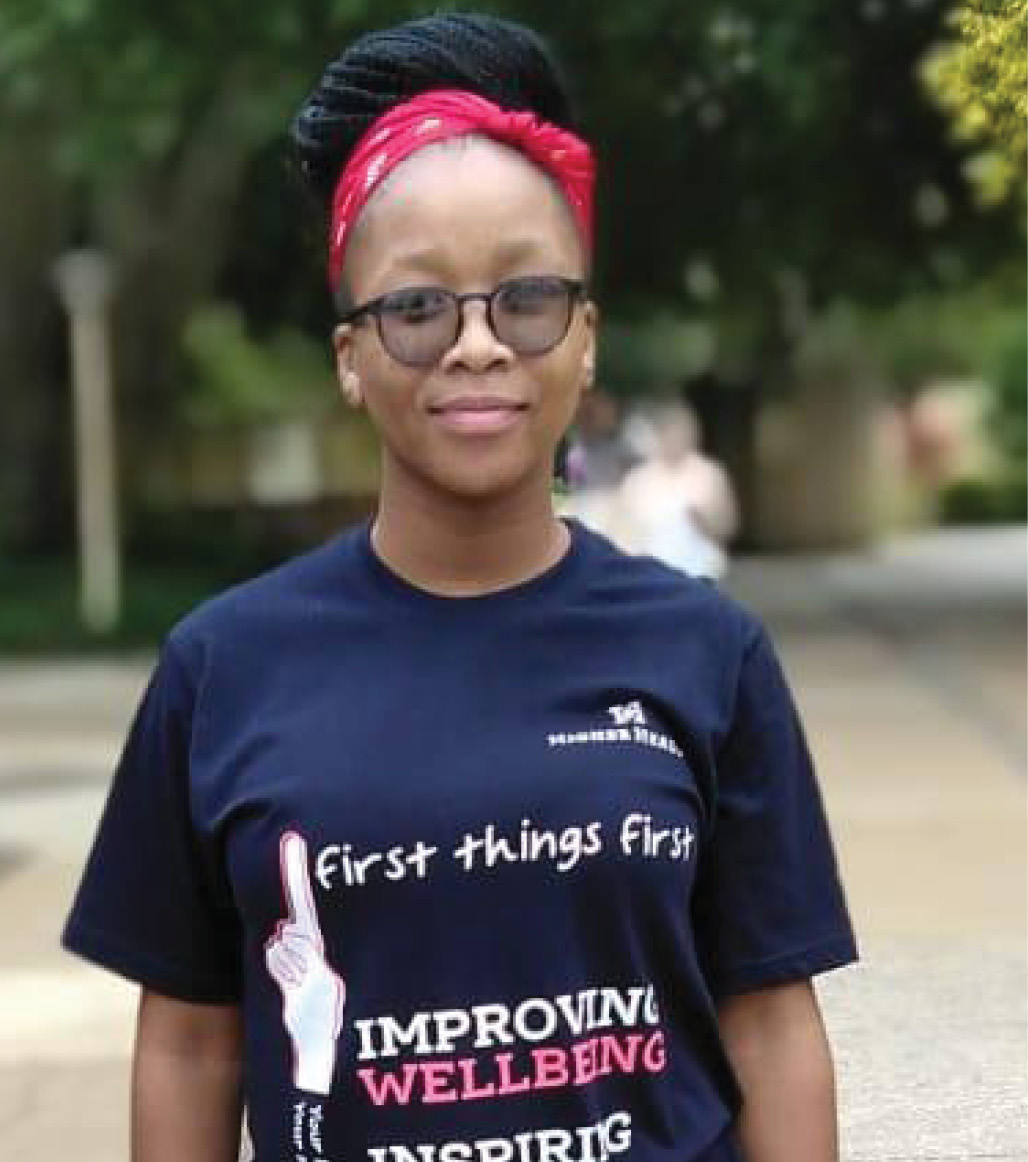
She is a recipient of National Student Financial Aid Scheme (NSFAS) funding, which has ensured that she enjoys her right to education.
However, she acknowledges that studying from home is challenging and requires more discipline than when she is on campus.
In the beginning of the lockdown, she used to take long breaks and watch television but soon realised that the routine was slowing down her progress.
“I thought I would have more time for myself, but no… I had to work twice as hard because there were no longer contact lectures and consultations. I stopped watching too much TV and started spending more time with my books. It is not easy but it is necessary because I cannot afford to lose my bursary. I have to make sure that I pass so that I can obtain my qualification,” she says.
Her message to the youth this month is that every generation has its own challenges, and the current challenge brought about by the pandemic must be dealt with by the youth in order to secure their future.
“It is important for us to follow government regulations – only leave your home when it is essential and try your best to limit your movement,” she says.
Students who have enquiries or complaints can call the Department of Higher Education and Training’s call centre at 0800 872 222, the NSFAS toll-free line at 0800 067 327 or World Skills South Africa at 086 999 0125.
Summary of Level 3 Regulations
Summary of Level 3 Regulations Joy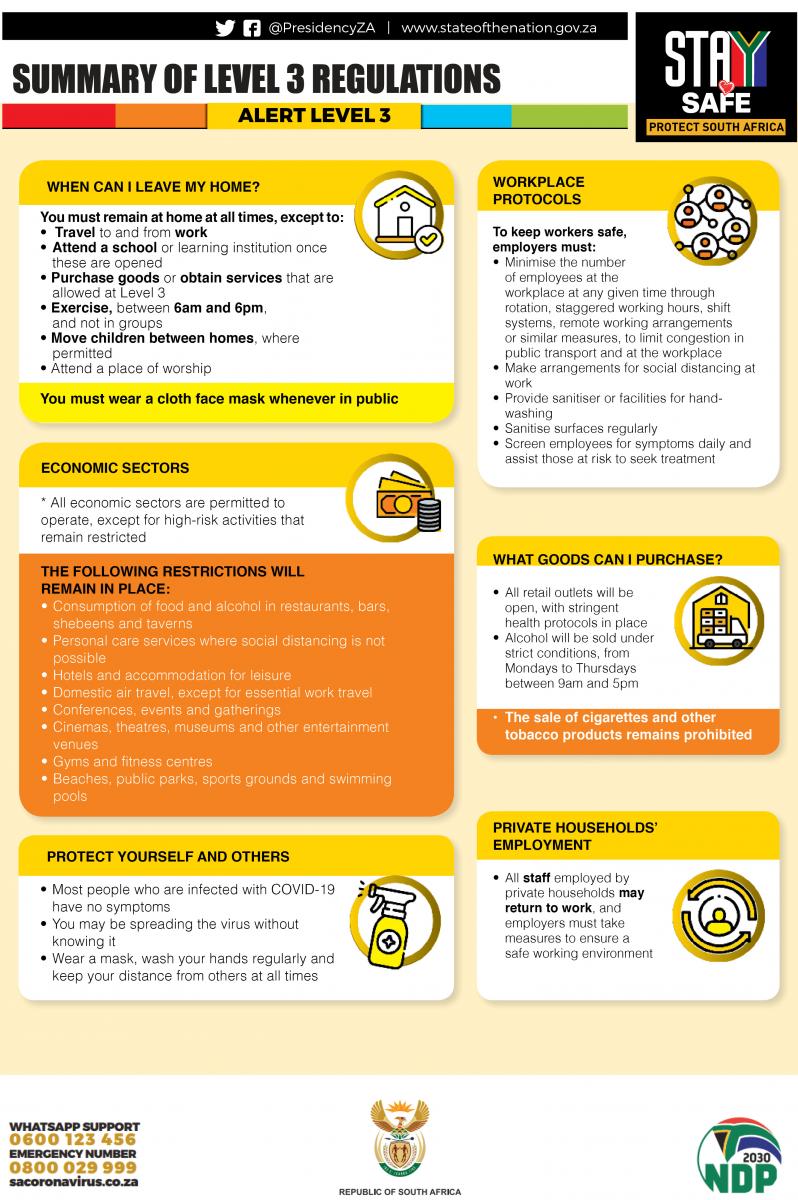
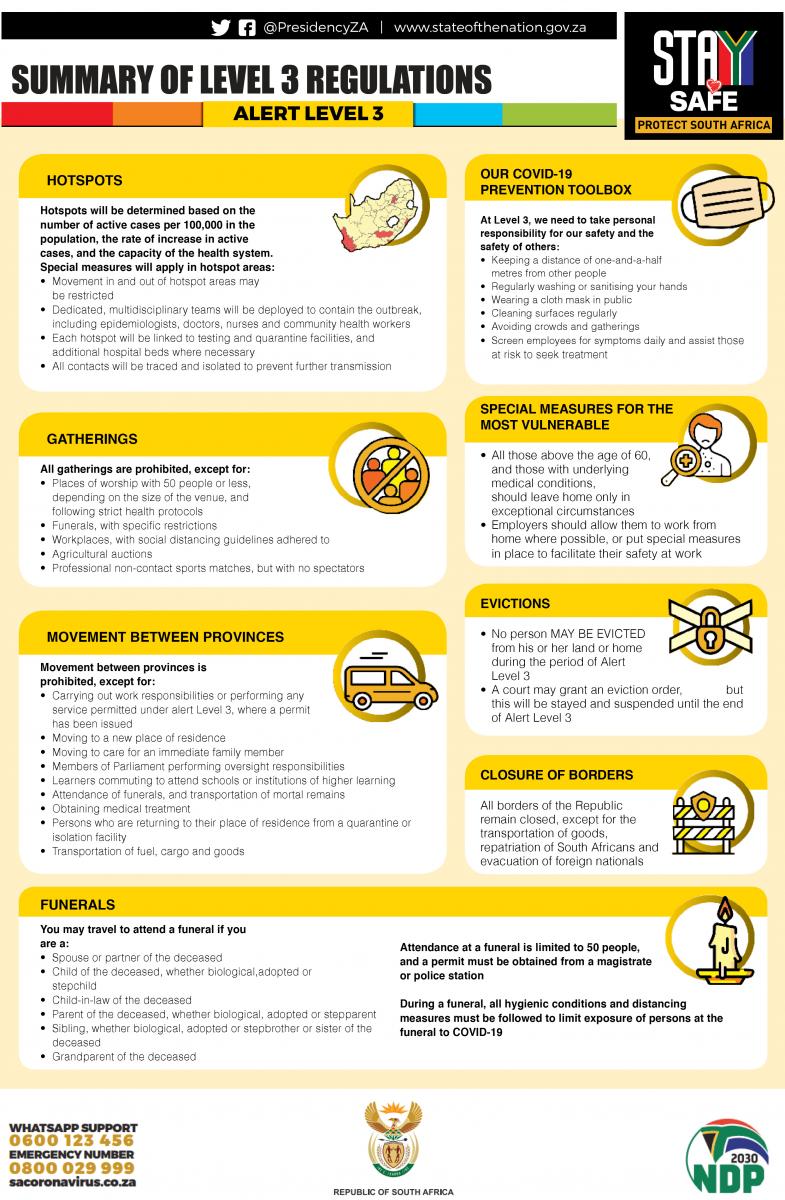
The ins and outs of Level 3
The ins and outs of Level 3 vuyelwanSouth Africa moved to Level 3 of its risk-based approach to contain the spread of the coronavirus disease (COVID-19) on 1 June. The Minister of Cooperative Governance and Traditional Affairs, Nkosazana Dlamini-Zuma, announced Level 3’s regulations on 28 May.
“Thanks to your sacrifices and contributions we have managed to flatten the curve, but the peak of the curve remains on the horizon,” she said, urging all citizens to redouble their efforts to further contain the spread of COVID-19 and prevent deaths.
“Level 3 allows us to open up all productive sectors of our economy, all be it to a moderate degree in some high-risk sectors.” 
In Level 3, everyone who enters a workplace or public space or uses public transport must wear a cloth face mask or a homemade item that covers the nose and mouth.
What is allowed?
- The curfew has been lifted.
- Alcohol sales are allowed from Monday to Thursday, from 9am to 5pm, however onsite consumption is prohibited. E-commerce alcohol sales are permitted, subject to the same trade days and times.
- Domestic workers can return to work.
- The sale of hot food in stores will resume, you can pick up takeaways and drive-throughs are open.
- Domestic air travel for business purposes is allowed.
- Exercise is allowed daily, between 6am and 6pm, but not in organised groups.
- All wholesale and retail stores, including spaza shops, are open.
- Travelling to and from work, to buy available goods and services and for medical attention is allowed.
- Travel between provinces and districts for learners, students and teaching staff is allowed, but you need a permit.
- Religious gatherings are allowed, but under strict conditions, and only 50 people can attend.
- Workplace gatherings are permitted under strict conditions.
- Only 50 people are allowed to attend a funeral. Interprovincial travel continues to be limited for attending funerals.
- International travel, but only under exceptional circumstances, including returning to work, study or a residence in South Africa or abroad.
What is not allowed?
- The sale of tobacco, tobacco products, e-cigarettes and related products remain prohibited, except when they are destined for the export market.
- Social gatherings are still prohibited.
- You may not visit family members or friends.
- Public training, fitness and recreation facilities remain closed, except for professional non-contact sports matches, without spectators.
- Hairdressers and beauty services remain closed.
- Travel between provinces remains prohibited, with the exception of those in possession of permits to attend funerals, conduct essential services and conduct Level 3 functions.
- Movements between metropolitan areas and districts and hotspots is prohibited, except for travel to start work, moving to a new residence or caring for an immediate family member. A permit is needed.
- Onsite consumption places for food, entertainment and recreation remain closed, including restaurants, shebeens, taverns, nightclubs, bars, cinemas, theatres, parties, bazaars, casinos and similar places.
- Hotels, lodges, bed and breakfasts, timeshare facilities and resorts and guest houses remain closed, except those accommodating remaining tourists, persons who need accommodation for work purposes and for quarantine and isolation.
- International ports of entry remain closed, except for the transportation of fuel, cargo and goods, humanitarian operations, repatriations, evacuations, medical emergencies, movements for diplomatic and international organisations and staff.
- The eviction of tenants is still prohibited. However, provision has been made for a competent court to grant an eviction order if it’s just and equitable.
Movement of children
Children who go to school have to carry permits with them. These permits are issued by the head of the relevant school or educational institution.
Adults who transport children to school must have a permit issued by the head of the school or educational institution that the child attends.
The regulations distinguish between children who are moved within district and metropolitan boundaries, and those who need to cross these boundaries. To move a child legally from one residence to another, within the same district or metropolitan area, an adult must have a court order, parenting plan or permit issued by a magistrate. To move a child legally to a different district, metropolitan area or province, an adult must have a permit issued by a magistrate.
To view the full list of regulations for Level 3, visit www.gov.za.
Tour guides included in new relief fund
Tour guides included in new relief fund JoyTour guides whose livelihoods are affected by the coronavirus disease (COVID-19) are set to benefit from a Department of Tourism fund.
 Minister of Tourism Mmamoloko Kubayi-Ngubane says the department has created a R30 million fund that will assist guides who work as freelancers and independent contractors. The fund will provide financial relief over a period of two to three months.
Minister of Tourism Mmamoloko Kubayi-Ngubane says the department has created a R30 million fund that will assist guides who work as freelancers and independent contractors. The fund will provide financial relief over a period of two to three months.
The beneficiaries will include:
- Tour guides who are registered with the registrar in terms of the Tourism Act.
- Freelancers or independent contractors without job security, in other words tour guides who are not employed by any company and have not formed their own companies.
Independent tour guides were not included in the Department of Tourism’s Tourism Relief Fund, which assisted businesses impacted by COVID-19. This fund provides a once-off R50 000 grant to subsidise expenses towards fixed costs, operational costs and other pressure-cost items. Over 6 000 applications were received. Of these, 2 495 came from businesses that provide accommodation services, 1 825 from the hospitality sector, 1 780 from travel-related service operators and in 662 from other tourism businesses.
Minister Kubayi-Ngubane says tourism businesses are fighting for survival and that almost 600 000 jobs could be lost if the sector does not reopen by September.
“Although we will be gradually opening up the sector in the coming months, depending on how the virus spreads, we expect that the sector will only fully recover towards the end of this year.
“We are working closely with the sector to develop the necessary protocols and guidelines. I have tasked the South African Tourism (SAT) CEO with driving the process of developing a draft tourism recovery plan for South
Africa.”
SAT has been hosting weekly webinars with various tourism stakeholders to get their inputs on a post-COVID-19 tourism sector.
When the country entered level 3 of the lockdown, several tourism industry-related businesses were allowed to reopen, including professional services such as tour guides, tour operators and travel agents; public and private game farms for self-drive excursions and hunting and gaming activities, to name a few.
“The hunting industry contributes an estimated R2 billion in direct spending annually to the tourism sector and it also contributes to employment in rural areas so this is an important step towards the recovery of the sector,” says Minister Kubayi-Ngubane.
For more information about claiming from the fund for tour guides, contact the Department of Tourism at 0860 868 747 or visit www.tourism.gov.za
Youth can help defend SA from the coronavirus
Youth can help defend SA from the coronavirus angenithaDr Nokukhanya Khanyile (28) works in the paediatric department at the Rahima Moosa Mother and Child Hospital in Johannesburg. As a young doctor, she knows all about the potential dangers of the coronavirus (COVID-19).
She says her hospital is one of the many public hospitals in Gauteng that have adapted to the arrival of the virus.
“Our entire approach to patients with respiratory illnesses has changed. Our wards have now been set up according to low-risk and high-risk patients. We also have to carry our own hand sanitiser and wear a surgical mask for the entire workday,” says Dr Khanyile. 
“As a result of the national lockdown, I was better able to help ill patients who needed assistance as hospitals were less busy with non-urgent or trauma-related complaints. I was able to spend more time understanding patient conditions and giving appropriate feedback,” she explains.
Gauteng was originally the country’s main COVID-19 hotspot, but the interventions put in place by government have kept the number of cases relatively low. This has included training healthcare workers in best practices to prevent the spread of the virus, as well as dealing with COVID-19 cases.
“The most impressive thing has been the constant communication with employees, especially through social media pages,” she says.
As she continues her essential work in healthcare, Dr Khanyile encourages the youth to be at the frontlines of fighting COVID-19 by following good hygiene practices and practising social distancing.
“The most important thing to remember is that you need not panic; you are the frontline of defence in this pandemic. If you do all of the right things to keep safe, then medical professionals or essential workers have less of a chance of being exposed to the virus and, because we are the last line of defence, we have a better chance of minimising the spread.”
She says that the youth have a responsibility to learn from their elders and mentors, in order to create a better South Africa for the future.
“As young people, we are the ones who will be carrying the baton into the future. It is up to us to learn as much as we can now from our leaders in order to make wise decisions when it is our time to make laws, when we eventually take their places. It may seem far away but we are stronger together than alone.”